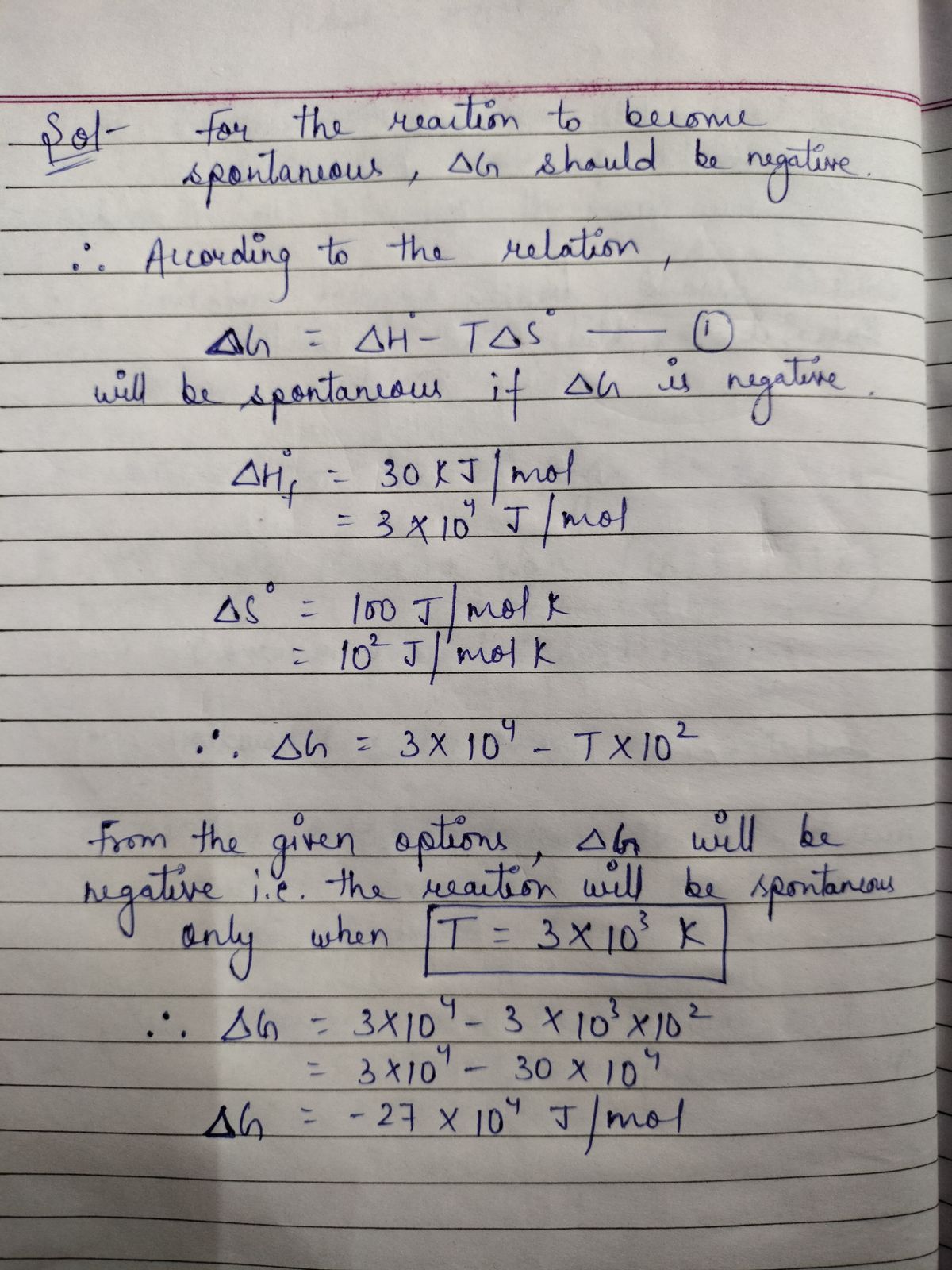Consider a chemical reaction that has a AH°f = 30.0 kJ/mol and a AS° = 100.0 J//mol•K). At what temperature does this reaction become spontaneous? 2.00 x 102 K 3.00 х 103 к 1.30 х 10? к 7.00 x 101 K 3.00 x 102 K
Consider a chemical reaction that has a AH°f = 30.0 kJ/mol and a AS° = 100.0 J//mol•K). At what temperature does this reaction become spontaneous? 2.00 x 102 K 3.00 х 103 к 1.30 х 10? к 7.00 x 101 K 3.00 x 102 K
Chemistry
10th Edition
ISBN:9781305957404
Author:Steven S. Zumdahl, Susan A. Zumdahl, Donald J. DeCoste
Publisher:Steven S. Zumdahl, Susan A. Zumdahl, Donald J. DeCoste
Chapter1: Chemical Foundations
Section: Chapter Questions
Problem 1RQ: Define and explain the differences between the following terms. a. law and theory b. theory and...
Related questions
Question
![**Problem Statement:**
Consider a chemical reaction that has a ΔH° = 30.0 kJ/mol and a ΔS° = 100.0 J/(mol•K). At what temperature does this reaction become spontaneous?
**Options:**
- ○ 2.00 x 10² K
- ○ 3.00 x 10³ K
- ○ 1.30 x 10² K
- ○ 7.00 x 10¹ K
- ○ 3.00 x 10² K
**Explanation:**
To determine the temperature at which the reaction becomes spontaneous, you will use the Gibbs free energy equation:
\[ \Delta G = \Delta H - T \Delta S \]
A reaction is spontaneous when \(\Delta G < 0\).
Given:
- \(\Delta H° = 30.0 \text{ kJ/mol} = 30000 \text{ J/mol}\)
- \(\Delta S° = 100.0 \text{ J/(mol•K)}\)
Set the equation to zero and solve for \(T\):
\[ 0 = 30000 - T \times 100 \]
\[ T = \frac{30000}{100} = 300 \text{ K} \]
Thus, the temperature at which the reaction becomes spontaneous is 300 K.](/v2/_next/image?url=https%3A%2F%2Fcontent.bartleby.com%2Fqna-images%2Fquestion%2Fec3b779b-d0d6-4768-9dcd-21f6961c75e0%2F21383d57-2a3d-4653-b4f7-2fb7ca101add%2F1k3fq0n_processed.png&w=3840&q=75)
Transcribed Image Text:**Problem Statement:**
Consider a chemical reaction that has a ΔH° = 30.0 kJ/mol and a ΔS° = 100.0 J/(mol•K). At what temperature does this reaction become spontaneous?
**Options:**
- ○ 2.00 x 10² K
- ○ 3.00 x 10³ K
- ○ 1.30 x 10² K
- ○ 7.00 x 10¹ K
- ○ 3.00 x 10² K
**Explanation:**
To determine the temperature at which the reaction becomes spontaneous, you will use the Gibbs free energy equation:
\[ \Delta G = \Delta H - T \Delta S \]
A reaction is spontaneous when \(\Delta G < 0\).
Given:
- \(\Delta H° = 30.0 \text{ kJ/mol} = 30000 \text{ J/mol}\)
- \(\Delta S° = 100.0 \text{ J/(mol•K)}\)
Set the equation to zero and solve for \(T\):
\[ 0 = 30000 - T \times 100 \]
\[ T = \frac{30000}{100} = 300 \text{ K} \]
Thus, the temperature at which the reaction becomes spontaneous is 300 K.
Expert Solution
Step 1

Step by step
Solved in 2 steps with 1 images

Recommended textbooks for you

Chemistry
Chemistry
ISBN:
9781305957404
Author:
Steven S. Zumdahl, Susan A. Zumdahl, Donald J. DeCoste
Publisher:
Cengage Learning

Chemistry
Chemistry
ISBN:
9781259911156
Author:
Raymond Chang Dr., Jason Overby Professor
Publisher:
McGraw-Hill Education

Principles of Instrumental Analysis
Chemistry
ISBN:
9781305577213
Author:
Douglas A. Skoog, F. James Holler, Stanley R. Crouch
Publisher:
Cengage Learning

Chemistry
Chemistry
ISBN:
9781305957404
Author:
Steven S. Zumdahl, Susan A. Zumdahl, Donald J. DeCoste
Publisher:
Cengage Learning

Chemistry
Chemistry
ISBN:
9781259911156
Author:
Raymond Chang Dr., Jason Overby Professor
Publisher:
McGraw-Hill Education

Principles of Instrumental Analysis
Chemistry
ISBN:
9781305577213
Author:
Douglas A. Skoog, F. James Holler, Stanley R. Crouch
Publisher:
Cengage Learning

Organic Chemistry
Chemistry
ISBN:
9780078021558
Author:
Janice Gorzynski Smith Dr.
Publisher:
McGraw-Hill Education

Chemistry: Principles and Reactions
Chemistry
ISBN:
9781305079373
Author:
William L. Masterton, Cecile N. Hurley
Publisher:
Cengage Learning

Elementary Principles of Chemical Processes, Bind…
Chemistry
ISBN:
9781118431221
Author:
Richard M. Felder, Ronald W. Rousseau, Lisa G. Bullard
Publisher:
WILEY